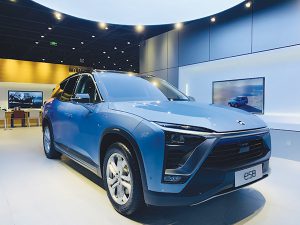Bloomberg
Nio Inc founder and Chief Executive Officer William Li said the Chinese EV maker may face a challenging first half as a cut in government subsidies and the broader economic slowdown erode local demand in the world’s largest new-energy vehicle market.
Customers are likely to try place orders before the end of the year, when the national subsidies for electric vehicles are expected to be phased out, Li said at a briefing after the company’s launch of its latest models at a weekend event in Hefei, central China.
“It will also take time for both the supply chain and consumer confidence to recover from the pandemic,†Li said, adding that he expects a full recovery in May or June.
The Shanghai-based automaker’s production has been upended by the effects of Covid. China’s initial strict adherence to its Covid Zero policy handicapped production, logistics, and delivery, before the government’s reversal in policy led to a sharp increase in infections, forcing Nio to miss its annual delivery target of 150,000 units.
The company needs “to actively strengthen our capabilities in demand forecast and rapid response†under such a volatile and uncertain situation, Li said. Nio aims to set up a system together with suppliers to disclose inventory conditions for semiconductors and raw materials, as well as staffing, equipment investment and production capacity. If there are changes in supply or demand, each player would then be prepared in order to respond rapidly, Li said.
Nio has taken precautions by storing more components,
increasing orders from the original chip-makers and exchanging semiconductors with other automakers, Li said. He called on carmakers and suppliers to “reasonably place orders for chips†because of possible panic buying.
Covid outbreaks have the potential to cripple production and disrupt employee rosters, threatening the global supply of everything from cars and golf carts to kitchen appliances.
Nio has in the past two years collaborated with component-making partners to support each other with workers when necessary, Li said.
Deliveries of new-energy vehicles — pure electric and hybrid cars — to dealerships in China are expected to reach 6.5 million by the end of the year, and may touch 8.4 million in 2023, China’s Passenger Car Association said. Still, the year-on-year growth rate is slowing.
Overall profit for the industry, excluding Tesla Inc, could be negative, given the huge spike in costs of raw materials for EV batteries, Li said.
“There was in fact no actual shortage of EV batteries, at least not as severe as the chip shortage,†he said.
 The Gulf Time Newspaper One of the finest business newspapers in the UAE brought to you by our professional writers and editors.
The Gulf Time Newspaper One of the finest business newspapers in the UAE brought to you by our professional writers and editors.
